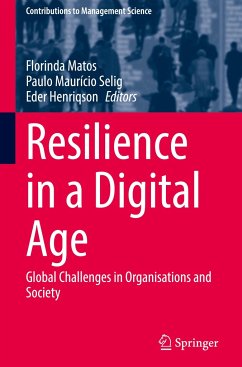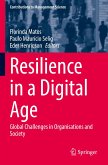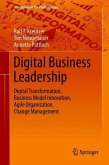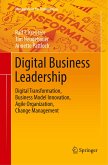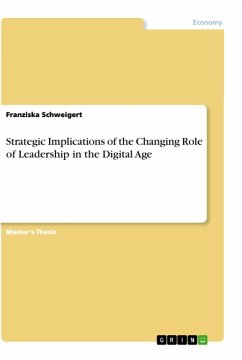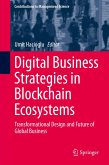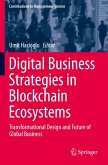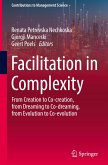Resilience in a Digital Age
Global Challenges in Organisations and Society
Herausgegeben:Matos, Florinda; Selig, Paulo Maurício; Henriqson, Eder
Resilience in a Digital Age
Global Challenges in Organisations and Society
Herausgegeben:Matos, Florinda; Selig, Paulo Maurício; Henriqson, Eder
- Gebundenes Buch
- Merkliste
- Auf die Merkliste
- Bewerten Bewerten
- Teilen
- Produkt teilen
- Produkterinnerung
- Produkterinnerung
In recent years, decision-makers from all sectors have been using 'resilience' as a keyword for managing societal turbulences. But what is resilience? How can we benefit from integrating digital transformation and resilience?
In this book, some of the world's leading experts on resilience explore the issue and discuss possible answers to these questions. The editors of this book believe that resilience is the master key for the future. However, they also remind us that people are at the base of any process of resilience and, only by placing people at the center of transformation, can we…mehr
Andere Kunden interessierten sich auch für
![Resilience in a Digital Age Resilience in a Digital Age]() Resilience in a Digital Age123,99 €
Resilience in a Digital Age123,99 €![Digital Business Leadership Digital Business Leadership]() Ralf T KreutzerDigital Business Leadership77,99 €
Ralf T KreutzerDigital Business Leadership77,99 €![Digital Business Leadership Digital Business Leadership]() Ralf T KreutzerDigital Business Leadership50,99 €
Ralf T KreutzerDigital Business Leadership50,99 €![Strategic Implications of the Changing Role of Leadership in the Digital Age Strategic Implications of the Changing Role of Leadership in the Digital Age]() Franziska SchweigertStrategic Implications of the Changing Role of Leadership in the Digital Age47,95 €
Franziska SchweigertStrategic Implications of the Changing Role of Leadership in the Digital Age47,95 €![Digital Business Strategies in Blockchain Ecosystems Digital Business Strategies in Blockchain Ecosystems]() Digital Business Strategies in Blockchain Ecosystems132,99 €
Digital Business Strategies in Blockchain Ecosystems132,99 €![Digital Business Strategies in Blockchain Ecosystems Digital Business Strategies in Blockchain Ecosystems]() Digital Business Strategies in Blockchain Ecosystems131,99 €
Digital Business Strategies in Blockchain Ecosystems131,99 €![Facilitation in Complexity Facilitation in Complexity]() Facilitation in Complexity123,99 €
Facilitation in Complexity123,99 €-
-
-
In recent years, decision-makers from all sectors have been using 'resilience' as a keyword for managing societal turbulences. But what is resilience? How can we benefit from integrating digital transformation and resilience?
In this book, some of the world's leading experts on resilience explore the issue and discuss possible answers to these questions. The editors of this book believe that resilience is the master key for the future. However, they also remind us that people are at the base of any process of resilience and, only by placing people at the center of transformation, can we aspire to have resilient organizations and a resilient society.
In this book, some of the world's leading experts on resilience explore the issue and discuss possible answers to these questions. The editors of this book believe that resilience is the master key for the future. However, they also remind us that people are at the base of any process of resilience and, only by placing people at the center of transformation, can we aspire to have resilient organizations and a resilient society.
Produktdetails
- Produktdetails
- Contributions to Management Science
- Verlag: Springer / Springer International Publishing / Springer, Berlin
- Artikelnr. des Verlages: 978-3-030-85953-4
- 1st edition 2022
- Seitenzahl: 348
- Erscheinungstermin: 11. März 2022
- Englisch
- Abmessung: 241mm x 160mm x 25mm
- Gewicht: 688g
- ISBN-13: 9783030859534
- ISBN-10: 3030859533
- Artikelnr.: 62323894
- Herstellerkennzeichnung Die Herstellerinformationen sind derzeit nicht verfügbar.
- Contributions to Management Science
- Verlag: Springer / Springer International Publishing / Springer, Berlin
- Artikelnr. des Verlages: 978-3-030-85953-4
- 1st edition 2022
- Seitenzahl: 348
- Erscheinungstermin: 11. März 2022
- Englisch
- Abmessung: 241mm x 160mm x 25mm
- Gewicht: 688g
- ISBN-13: 9783030859534
- ISBN-10: 3030859533
- Artikelnr.: 62323894
- Herstellerkennzeichnung Die Herstellerinformationen sind derzeit nicht verfügbar.
Florinda Matos is the founder and president of ICAA - Intellectual Capital Association and an associate member of the New Club of Paris. She holds a PhD in social sciences and organizational behaviour studies from University of Lisbon, Portugal. She is a Professor of Management at Iscte - University Institute of Lisbon and a researcher at DINÂMIA'CET-IUL - Centre for Socioeconomic and Territorial Studies. She was also a postdoctoral researcher with a focus on the social impacts of additive manufacturing at NOVA University of Lisbon. Paulo Maurício Selig was president of the Brazilian Production Engineering Association, and a professor, co-founder and first coordinator of the graduate programme in knowledge engineering and management at the Federal University of Santa Catarina (UFSC, Brazil). He is an intellectual capital researcher and consultant, and permanent chairman of the International Conference on Knowledge and Innovation (ciKi). Currently, he is active in the research project dealing with the effects of human factors and resilience engineering on integrated operations Éder Henriqson is a professor of human factors and system safety in the School of Business, Pontifícia Universidade Católica do Rio Grande do Sul (PUCRS), Brazil. He has a PhD in production engineering and his research areas include complex sociotechnical systems, human factors, system safety, safety culture, cognitive systems engineering and decision making, and resilience engineering
1. Introduction.- Part I: Foundations, Concepts and Frameworks.- 2. Systemic Potentials for Resilient Performance.- 3. Resilience and Digital Transformation Challenges in Oil and Gas Integrated Operations.- 4. Relational Capital and Organisational Resilience.- 5. Organisational Resilience in the Digital Age: Management Strategies and Practice.- 6. Framework for the Analysis of Resilient Performance Conditionings in Integrated Operations of the Oil and Gas Industry.- 7. Relating National Intellectual Capital with Resilience, Reliability, Sustainability and Reputation of Countries.- Part II: Applications, Technologies and Digital Tools.- 8. Towards Sustainable Smart City via Resilient Internet of Things.- 9. Digital Ownership Strategies: The Health Care Services Case.- 10. Framework for Analysing Knowledge Critical to Organizational Resilience Capabilities.- 11. How Can Simulation Support Resilience in aDigital Age?.- 12. Cyber Resilience. A Preunderstanding for an Abductive Research Agenda.- 13. How can Digital Learning Tools be used to Promote Resilience in Healthcare?.- 14. Resilience, Digital Tools, and Knowledge Management Systems in the Pandemic era. The IHU Strasbourg Experience.- 15. A Knowledge Graph to Digitalise Functional Resonance Analyses in the Safety Area.- 16. Trapping Paper Checklists into Screens: How to Free the Resilience CapaIntroduction bility of Digital Checklists for Emergency and Abnormal Situations.- 17. The Case of Digitalisation in the Brazilian Development Bank (BNDES): How Brazilian Culture and the Institutional Values Influence the Process.- 18. Resilience Capability and Successful Adoption of Digital Technologies: Two Case Studies.
1. Introduction.- Part I: Foundations, Concepts and Frameworks.- 2. Systemic Potentials for Resilient Performance.- 3. Resilience and Digital Transformation Challenges in Oil and Gas Integrated Operations.- 4. Relational Capital and Organisational Resilience.- 5. Organisational Resilience in the Digital Age: Management Strategies and Practice.- 6. Framework for the Analysis of Resilient Performance Conditionings in Integrated Operations of the Oil and Gas Industry.- 7. Relating National Intellectual Capital with Resilience, Reliability, Sustainability and Reputation of Countries.- Part II: Applications, Technologies and Digital Tools.- 8. Towards Sustainable Smart City via Resilient Internet of Things.- 9. Digital Ownership Strategies: The Health Care Services Case.- 10. Framework for Analysing Knowledge Critical to Organizational Resilience Capabilities.- 11. How Can Simulation Support Resilience in aDigital Age?.- 12. Cyber Resilience. A Preunderstanding for an Abductive Research Agenda.- 13. How can Digital Learning Tools be used to Promote Resilience in Healthcare?.- 14. Resilience, Digital Tools, and Knowledge Management Systems in the Pandemic era. The IHU Strasbourg Experience.- 15. A Knowledge Graph to Digitalise Functional Resonance Analyses in the Safety Area.- 16. Trapping Paper Checklists into Screens: How to Free the Resilience CapaIntroduction bility of Digital Checklists for Emergency and Abnormal Situations.- 17. The Case of Digitalisation in the Brazilian Development Bank (BNDES): How Brazilian Culture and the Institutional Values Influence the Process.- 18. Resilience Capability and Successful Adoption of Digital Technologies: Two Case Studies.

